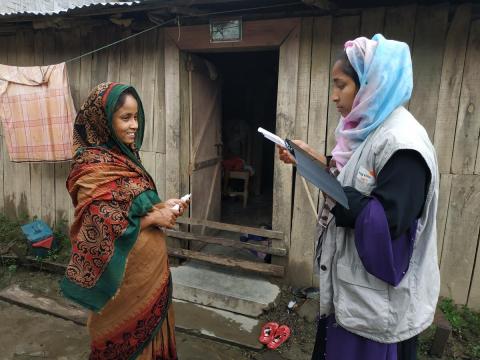COVID-19: A chance to empower citizens through social protection

By: Dr. Kathryn Taetzsch, Global Director, Cash, Voucher Programming, Disaster Management & Sue Cant, Social Accountability Adviser for World Vision International
Billions are now being distributed to citizens by governments[1] to stave off rising poverty from COVID-19. The unprecedented pandemic demands an unprecedented government response. More than 126 countries have already introduced or adapted social protection or labour policies to assist those in need. The World Bank, which has played a key role in building infant social protection systems in many developing countries, has urged countries, including Bangladesh, to increase safety nets in response to COVID-19. See here and here.
But bureaucrats – under intense pressure to deliver fast cash transfers – may not always reach those in need. Approaches exist – and are already being used – to ensure citizen feedback to government agencies so that government and donor social protection programmes reach those who need it most. Social accountability – or citizen feedback to government – has a decades-long history in India to ensure safety nets reach the most vulnerable. It has been used across the world, including Bangladesh, Indonesia, Paraguay, and elsewhere.
In the past three years in Bangladesh, World Vision used its social accountability methodology, Citizen Voice and Action, to ensure wider access of government safety nets to those in need, ensuring better access for women and the most vulnerable. It was the first project of its kind to assist vulnerable community members, especially ethnic minorities, to understand their entitlement to the social protection payments provided by the Bangladesh government.
An independent evaluation[2] of the project found that those receiving information about social protection, including age pensions, disability allowances, and food-for-work programmes, increased from 15% at the start of the project to 83% at the end of the project. Those target beneficiaries accessing safety nets – especially cash transfers – at the start of the project were as low as 5%, whereas at the end 74% of beneficiaries had accessed safety nets. This highlights that, while government may do the right thing by taking immediate action to roll-out safety nets, the way in which it is done through increasing information and providing a platform for citizen feedback, can help ensure those who need it most are reached.
To ensure that government committees selected the most vulnerable, the project was able to persuade government to include civil society organisation (CSO) representatives as observers on the committees. The project demonstrated that active civil society was able to persuade the government to increase the budget for safety nets, improve government guidelines, and increase the number of beneficiaries.
In sum, even where government intends to reach the most vulnerable, they can – through administrative complexity or corruption – miss their intended target for relief.
Ensuring those recipients of social protection have the information they need and a say in the relief and if it is reaching them, is both empowering, and critical to government efficiency and effectiveness in resource allocation.
Like many current responses hampered by the lockdown, adaptations are needed through technology applications. For example, some governments are using simple push and pull technology with WhatsApp. These can be adapted with simple templates for government to share critical information to communities, but, just as importantly, to give citizens a platform to reach government, in particular, social protection service providers. A wide array of issues need not be left to media to report by chance, such as lack of knowledge, access, life and death emergencies, police brutality, and more.
Recently in South Africa, the International Budget Partnership (IBP) demonstrated how citizen feedback can lead to government response in the era of COVID-19. See here.
In informal settlements where enforced government social distancing is challenging, IBP produced a quick guide for communities in eight languages to inform them of the need to stringently practice hand washing and keep as far apart from one another as possible. But, in addition to providing information, each week residents in 80 informal settlements, who were reached by cell phone and Internet, were asked three questions about their ability to access services – was clean water available, had toilets been cleaned in the previous week, and had garbage been collected.
IBP has been collating the data each week and releasing it through the media to highlight to the responsible government agencies. While not everything was improved, new water taps started appearing in settlements, as well as commitments to provide more toilets. The responsible national minister and three municipal governments reached out to IBP to collaborate.
In the era of COVID-19, effective services like water, sanitation, and social protection are needed more than ever, but to function they need the ongoing support of information and citizen feedback. It is therefore not only about receiving immediate basic survival assistance – humanitarian cash transfers – to the most vulnerable – but ensuring appropriate targeting, registration, and strengthened social accountability when governments start providing social protection – top-up transfers to those affected by disaster or pandemic-shocks. Citizen engagement can be strengthened through crises as World Vision has evidenced in many humanitarian fragile and development contexts, enabling effective transfer and service support to those most in need, across the Humanitarian-Development-Peace-Nexus.
Contacts
Kathryn_Taetzsch@wvi.org
Suzanne_Cant@wvi.org
[1] Including those provided through donor funds
[2] World Vision/EU, 2019, Establishing Vulnerable Peoples’ Rights and Access to Social Safety Net Programmes, Final Evaluation, December.
Featured image: Beneficiary registering for cash assistance after floods affecting Bandarban, Bangladesh © Bhojon Chiran and MD Sarwar Alam / World Vision
Cross-published by Global Partnership for Social Accountability Knowledge Platform